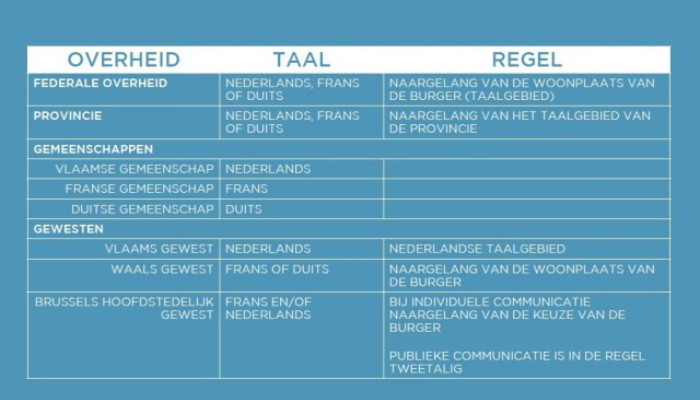'In principle, the language of each authority is that of the language area where it is located.'
10 questions - 2. In which language can I contact the authorities ?
2. In which language can I contact the authorities?
In principle, any contacts with the authorities take place in the language of the area where they are located. In Flanders, this is Dutch; in Wallonia, French or German; and in Brussels, Dutch or French. This rule usually only applies to the authorities themselves. You are therefore not always obliged to use the official language when addressing the authorities. In most cases, civil servants will only answer and documents will only be drawn up in the official language.
Due to its state structure, Belgium has many different levels of government. These include the federal (central) authorities, the Communities and Regions, which partially overlap, the provinces and the municipalities. You will probably come into contact with some authorities more often than others. In principle, the language of each authority is that of the language area where it is located. In other words: the language of that area is the language of administration. This rule always applies to the authorities. Therefore, you cannot just assume that civil servants will understand your language. In fact, in most cases the authorities are only allowed to reply in the official language. In addition, the documents of the authorities are only drawn up in the official language.
THE MUNICIPAL LEVEL
The municipality is the level of government that is closest to the people. This is where you collect your identity card, receive information about domestic waste collection, submit a change of address, register a birth, marriage, etc. Each municipality belongs to a specific language area and communicates in the language of that language area. A municipality in the Dutch language area only communicates in Dutch and a municipality in the French language area only in French. In Brussels, municipal civil servants must be able to help residents both in Dutch and in French.
The same language regulation applies to the openbare centra voor maatschappelijk welzijn or OCMWs (public centres for social welfare) which are associated with the municipality. OCMWs are responsible, among other things, for providing affordable housing and sufficient means to people with financial difficulties.
Language facilities : exception
A special regulation applies in the municipalities with facilities. These municipalities are situated in a monolingual language area, but offer ‘facilities’ to foreign-speaking inhabitants. Around Brussels there are six municipalities with facilities in the Dutch language area where facilities are provided to French-speaking residents. In Drogenbos, Kraainem, Linkebeek, Sint-Genesius-Rode, Wemmel and Wezembeek-Oppem residents may ask to receive a specific document in French. These municipalities are not bilingual like the municipalities in the Brussels-Capital Region. Here, official messages and communications must be both in Dutch and French, whereas individual communication normally takes place in Dutch. However, exceptionally this is also allowed in French.
From the very start there has been disagreement about the idea behind the facilities. French-speaking politicians consider them to be permanent language rights. To Flemish politicians, these facilities are a temporary privilege for newcomers from another language area who have not yet mastered the language. The legislation itself continues to be vague about the objectives. As a result, opposing interpretations continue to exist. This regulation is partially responsible for attracting a large number of French speakers (and foreign speakers) who want to come and live in the green Vlaamse Rand, close to Brussels. Because of this, the balance between the languages in these municipalities has shifted. The majority of the people living there are French speakers or foreign speakers who have not adapted to the Dutch-language character of the region. This leads to political discussions about the language status of these six municipalities.
FRUSTRATION
Some people show displeasure or incomprehension about the language rules used by municipal civil servants in the Vlaamse Rand. Why do these civil servants not simply speak French or English? Is it not so that most Flemish civil servants master these languages? Yet, the principle of the ‘language of that area being the language of administration’ is accepted almost everywhere in the world. No French or English is spoken in Spanish town halls either. In the Swiss city of Geneva you will only be addressed in French, although, like Brussels, the city houses a lot of international organisations (UN, WHO, UNAIDS, WTO). No Dutch is spoken in the French language area in Belgium either.
As they live close to Brussels, expats are inclined to think people manning the municipal service desk will help them in French. When officials stick to the official language (Dutch) rather than agreeing to speak another one (French or English), people tend to interpret this attitude as a form of harassment.
Meanwhile, many Flemish people regard the use of French as further language concessions and a lack of respect for the official administrative language and the structure of the Belgian state.
In the light of the fast-paced Frenchification of Brussels, the Flemish are concerned that the same situation is developing in the Vlaamse Rand around Brussels. That is why the Flemish authorities have adopted a policy seeking to protect the region's Flemish character and encourage people to speak Dutch.
Finally, a lot of Flemish people are annoyed about the one-sided character of this debate. Dutch speakers who move to the French language area of Belgium often do not have any problems learning French and use it in their contacts with the local authorities. The massive migration of Flemish people to the rich industrial Wallonia of the 19th and early 20th centuries did not lead to any Dutchification or Flemishification there.
Table: In which language can I contact the which authority?*
* The table can be found in English in the pdf brochure



